Contents
Guide


CONTENTS
PREFACE

Have you ever looked back at a piece of work you completed a long time ago and thought to yourself, I wish Id done that differently? When Mind Magic was originally published in 2003, it caused quite a stir. Some magicians didnt like it because they felt it exposed too much, others said there wasnt enough magic in it, and still others misunderstood what I was trying to do.
The reality is the book sold well across the world in several languages and still generates fan mail some 14 years after it was originally published. It went before the council of The Magic Circle (the worlds premier magical society) who honoured me with a promotion to a higher degree as a result. Their reviewer commented that it was one of the best books on the subject of mental magic written for over 20 years.
I admit to having felt a degree of apprehension when I was asked to review the book in preparation for this second edition. More than a decade had passed and the world has become a very different place. Would all the technological advances, and the four thousand magic performances I have notched up since the original publication, change my view of what I had written?
Magic is a physical art that transcends technology. It appeals to some very basic needs we have as humans to feel part of something bigger than ourselves. Whilst the exterior appearance of magic rightly changes to suit the current environment, the basic underlying principles do not. What I set out to do with this book is still very much relevant.
I felt (and still feel) that although correctly teaching the mechanics is vital, it is the understanding of how to frame a performance that was missing from the majority of magic books. The stories or scenarios were designed to show the importance of placing your magic in the right context. They are examples, laid out with the intention of making you think a little differently about how and when you perform.
My fears were unfounded. Although I have made a few changes to the text, mainly tidying, clarifying and updating, the book remains very much the same as it was fourteen years ago. One simple principle underpins my philosophy in creating, performing and writing about magic:
Magic is a narrative art form, so take your audience on a journey.

INTRODUCTION
We begin with a story
Long, long ago, a small group of our distant ancestors was watching the night sky, awestruck by the sights above.
They marvelled at the dazzling array of lights and shapes, and sought to find meaning in this heavenly display. Surely it must be a message from the gods? No! It was, they decided, the gods dancing for them. After a good few hours gazing, they lay down in their crude huts and went to sleep, safe in the knowledge that someone somewhere was looking out for them.
One night a member of the group was restless, and stayed up a little later than the others. Something was troubling him. Suddenly he was struck with an amazing thought. The light-show in the sky repeats itself, not every day, not always the same, but there is a pattern.
After a little more thought and a lot more watching, he could tell his friends what was going to happen during the coming nights. He knew which gods would be in the sky and when. As his predictions came true, the others began to treat him differently. He must be special, favoured by the gods and blessed with divine knowledge.
The observant one became powerful and respected in his tribe. Any problems or questions would be put to him for his opinion, and his words of advice followed closely. He was offered the best food available and his choice of mates. This was not a bad thing for his group, as he was probably of above average intelligence for his time and could therefore produce good-quality offspring.

Magic Through the Ages
Now, it may not have happened exactly like that, but those who could see order in the world around them and make sense of their environment would clearly thrive.
One question I have always pondered is this. What if we were to tell that ancient thinker that the stars are not in fact gods, but huge balls of gas and fire, a trillion times larger than his village, floating in an infinite void? He would think we were crazy.
Throughout history fact and fantasy have become intertwined as human beings search for answers and often find the truth far stranger than the fiction.
In the past many leaders relied upon wizards, wise men and seers to give them insight and thus aid their decisions, military or otherwise. A fine, albeit mythical example, of such a person was Merlin, magician to King Arthur.
Unfortunately, the path has not always been smooth for those with special abilities. Frequently controlled and pursued by those in power, their ability to predict the future posed a threat to the leaders absolute authority. In medieval times witches were supposedly burnt at the stake. (In fact, most convicted witches in England were hanged.) The increasing numbers of these poor souls coming before his court began to trouble one sixteenth-century justice of the peace. Reginald Scot was a devout Christian and stated that these certeine old women could not possibly be responsible for plagues, poor harvests, healing, controlling the weather or any of the feats attributed to them.
In his book The Discoverie of Witchcraft (1584), Scot wrote: But certeinlie, it is neither a witch, nor a divell, but a glorious God that maketh the thunder. In this text he set out to prove that witches possessed no special powers, and explained at length their rituals and the means by which they deceived. Although its purpose was to debunk rather than instruct, the book became the first in the English language to show how magic tricks could be performed by sleight of hand and other mechanical means.
While the book had its supporters, it was not welcomed by everyone. King James, for example, had it banned and decreed that all copies should be burnt. Nonetheless, it had a dramatic effect on magic and mysticism, acting as a catalyst in the development of conjuring as both art and entertainment. Indeed, you probably wouldnt be reading this book now if it were not for Reginald Scot.

Mental Magic
Since the eighteenth century, magic of all kinds has become almost universally acceptable. Modern-day witches and psychics are not persecuted, although they are still not totally trusted either. However, in the last fifty years or so there has been an enormous growth of interest in magic and mysticism just look at all the psychic fairs, weird shops, television shows and magazines devoted to these subjects.
This interest has been good for magicians, and we have developed our art to reflect it. This is particularly true of mentalism (mind-reading, thought transference and prediction) and bizarre magick (similar to mentalism, but with more supernatural and occultist themes, plus a lot of theatre to create a truly intense atmosphere). Great mentalists of the past have included Theo Anneman, while current exponents include Max Maven, Larry Becker and Derren Brown. In the field of bizarre magick Tony Andruzzi and Tony Doc Shiels have been influential. I for many years performed as Dr. Marcus.

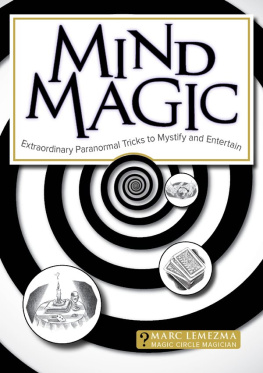
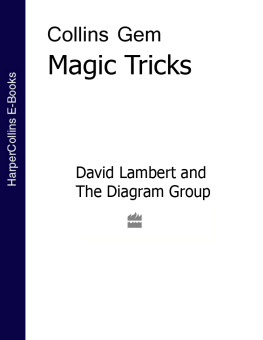
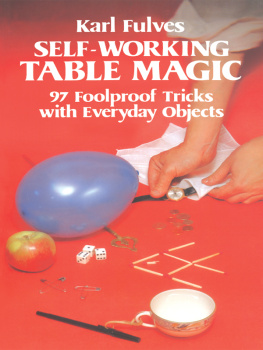

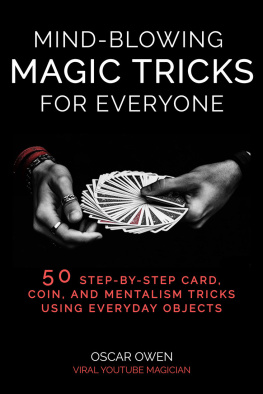
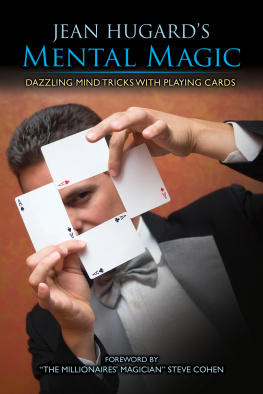
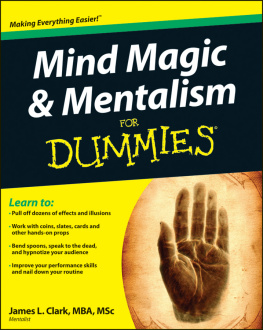

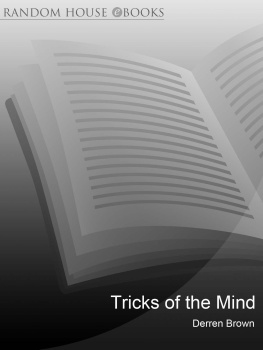
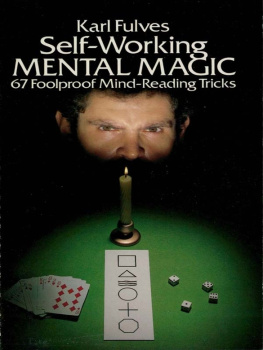
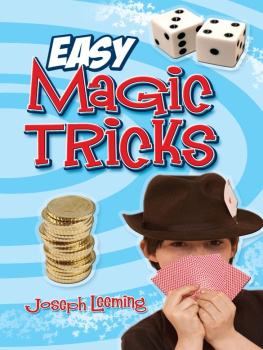





 Magic Through the Ages
Magic Through the Ages